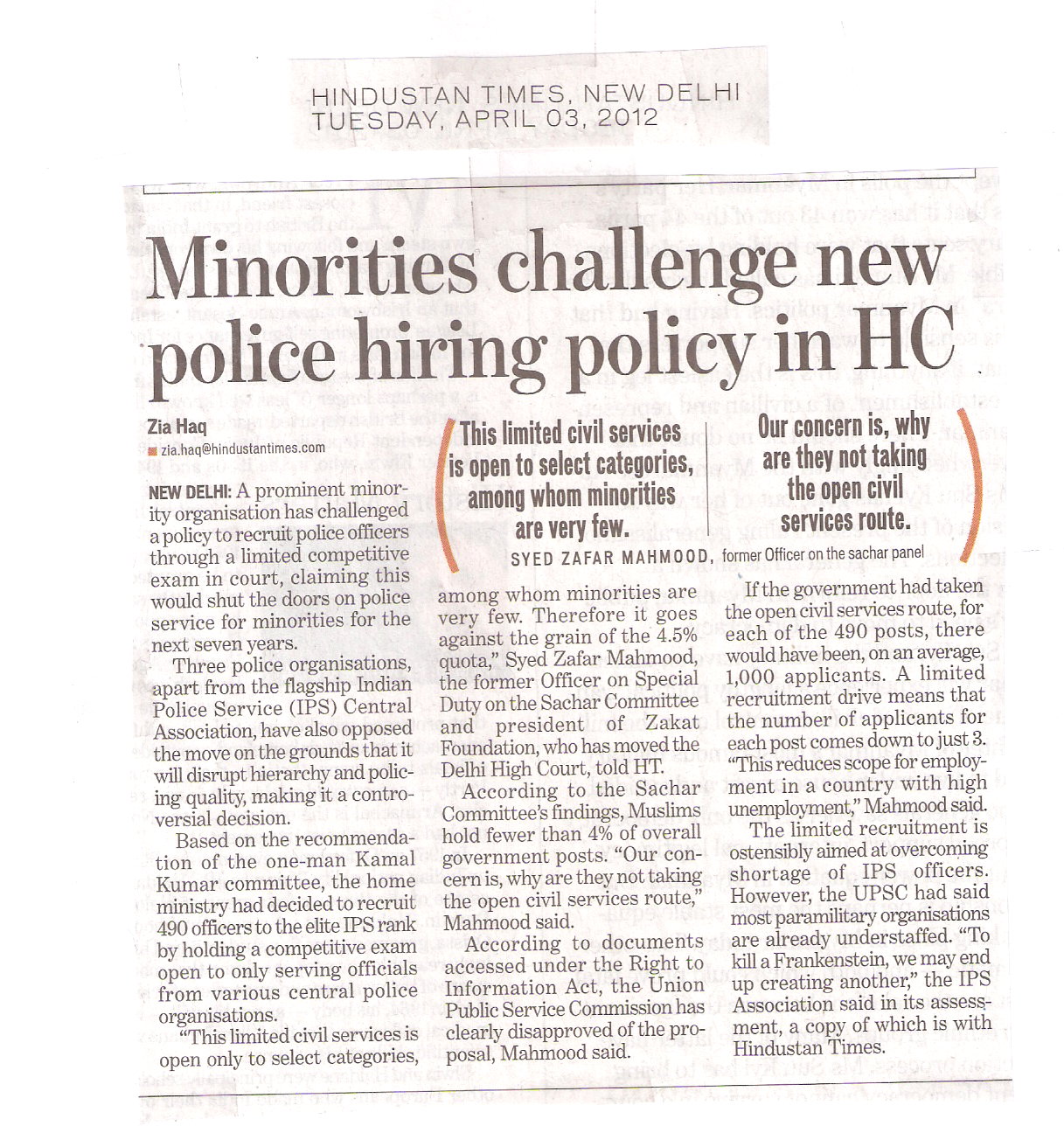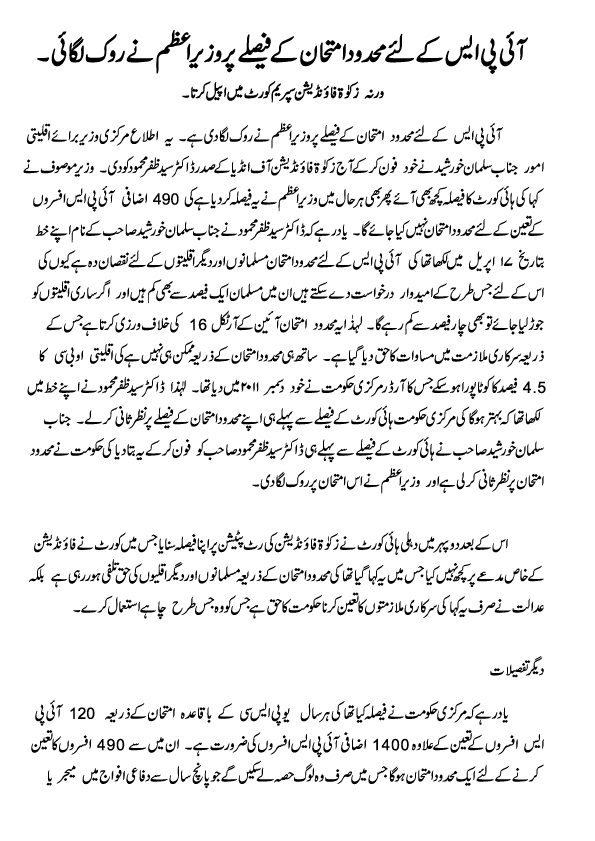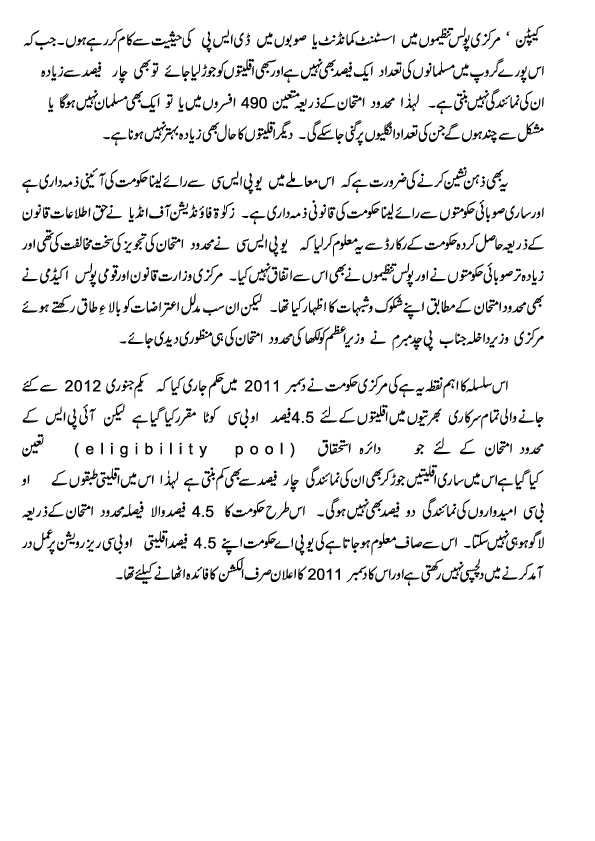|
|
 |

PM rescinds Limited Examination for IPS
Even though High Court does not entertain
Petition
The Prime Minister has decided to
overrule the Home Ministry and rescind its decision to conduct a Limited
Examination for recruitment of 490 IPS officers. This was conveyed by
the Minister of Minority Affairs Mr. Salman Khurshid to the ZFI
President, Dr. Syed Zafar Mahmood before the High Court delivered its
verdict not to entertain this writ petition on technical grounds that it
is the government’s prerogative how to select its staff.
ZFI President Dr. Syed Zafar Mahmood had written to the Minister of
Minority Affairs Mr. Salman Khurshid on 17 April inviting his attention
to the major lacunae in the Government’s decision to conduct the Limited
Examination. These include violation of Article 16 which gives right to
equality of opportunity in public employment, insufficient availability
of minority OBC candidates to fulfill the 4.5% sub quota, strong
objections of the UPSC which could not be contraverted by the government
and massive disagreement of the state governments. Hence the government
reviewed its decision and the Prime Minister put a cap on the Limited
Competitive Examination for IPS. The required official notification is
expected shortly.
It would be recalled that Zakat Foundation of India (ZFI)
www.zakatindia.org had challengedo the central Government's decision to
select 490 IPS officers through a limited competitive examination (LCE).
The well known national level charitable NGO echoes the strong country
wide minority objection that the LCE kills their fundamental right under
article 16 that guarantees equality of opportunity in public employment.
This is because in the limited eligibility pool the availability of all
minorities grouped together is less than four percent while their
presence at the national level is nineteen percent.
The statistics of Muslims reflects much worse scenario. Their national
presence is 13.4% while their availability in the limited eligibility
pool of LCE is less than one percent. Also, the LCE shows that the UPA
Government is really not interested in implementing it's own decision of
4.5% minority sub quota in public services that was announced with
fanfare on the eve of the assembly elections for UP and four other
states held in Feb-March 2012. Subsequently notification was issued by
the central goveernment's department of personnel & training (DoPT) two
days before the election commission's code of conduct came into force.
Earlier, ZFI collected under RTI Act numerous detailed documents from
the PMO, Personnel Ministry and Home Ministry. It found that the UPSC
and more than half of the state governments and central police
organizations had strongly disagreed with the LCE proposal. According to
UPSC there are one thousand candidates for each vacancy filled through
its annual Civil Services Examination (CSE) while there would be only
three candidates for each vacancy in LCE. Also there is existing acute
shortage of middle level officers in the central police organizations.
This was also stated by the MoS, Home in the Lok Sabha on 8 March 2012.
The Law Ministry and National Police Academy too had expressed their
apprehensions. The central IPS Officers Association has represented to
the Home Minister against the LCE. Several state units of IPS
association have filed writ petitions.
The LCE advertisement published in Employment News on 10 March 2012
inviting online applications omits one vital information that is of
basic relevance for the prospective applicants. The Record of Discussion
which the Home Minister had, through which the UPSC was over-ruled, says
in para 9(ii) that the IPS officers selected during ant year through LCE
shall be placed in seniority below their counterparts selected in the
same year through the CSE. Had the applicants known about this
step-motherly treatment is to be meted out to them many of them would
have opted out.
-----------------------------
Details:
1. The Central Government decided some time ago that out of the
additional recruitment of IPS officers, 490 officers shall be selected
through a Limited Competitive Examination. Only those persons will be
able to apply for LCE who have been working for 5 years or more as major
or captain in the Defence Forces, Assistant Commandant in Central Police
Organizations or Deputy Superintendent of Police in the states.
2. The pool of such candidates has less than one per cent Muslims as
against their census population of 13.4 per cent. Also all the minority
communities together are not more than 4% in such limited pool of
candidates against their national population share of 19%. All the more,
through the LCE, the Government of India will never be able to implement
its sub quota of 4.5% for minorities carved out of the 27% OBC
reservation.
3. That is why Zakat Foundation of India collected necessary information
from the PMO, the Ministry of Personnel and Home Ministry. It found that
the LCE proposal was strongly opposed by the UPSC consulting whom for
this purpose is the constitutional duty of the central government.
Majority of the state governments also opposed the LCE while consulting
them is the statutory duty of the government under the All India
Services Act 1951. It was also opposed by most of the Central Police
Organizations. The Law Ministry and the National Police Academy
expressed their reservation. Yet, all these objections and apprehensions
were over-ruled and the LCE was approved at the instance of the Home
Ministry. The IPS Officers Association has represented to the Home
Minister against implementing the LCE.
4. The UPSC argued that for each vacancy in the annual Civil Services
Examination (CSE) there are one thousand candidates while under the LCE
only three candidates are available for each vacancy. This puts the CSE
selection quality at much higher pedestal than the LCE. There is acute
shortage of middle level officers in the central police organizations.
Taking out officers from there for IPS would exacerbate the shortage
there. The IPS officers coming from two different streams - CSE & LCE -
would always have mutual issues of comparative morale to the ultimate
detriment of policing. Thus the UPSC strongly suggested that instead of
LCE, the Government should enhance the number of IPS officers selected
every year through CSE from 120 to 180-200. This has also been done
recently in case of the IAS.
5. The UPSC advertisement dated 10 March 2012 inviting online
applications for LCE did not mention that the IPS officers selected
through LCE in a particular year shall be placed in seniority below
their counterparts selected the same year through CSE. Having known this
many candidates would have opted out of LCE.
6. Zakat Foundation of India, a Delhi based charitable Registered Trust
filed a writ petition against the LCE in Delhi High Court. On the first
hearing on 21 March 2012 Chief Justice A.K. Sikri & his associate
Justice Rajiv Sahai ordered the Government of India to produce before
the court the relevant record. On 28 March the relevant record was
produced before the court which ordered that the record should be shown
during the lunch time to Zakat Foundation of India who should ascertain
whether, as claimed by the Additional Solicitor General, the UPSC had
concurred with the Central Government about the utility of LCE for IPS
recruitment. Such inspection was jointly done by the President, Zakat
Foundation of India Dr. Syed Zafar Mahmood and the NGO’s advocate Mr.
Amber Qamaruddin. Rev. Fr. Packiam Samuel, General Secretary of
Interfaith Coalition for Peace was also present in the court room.
7. After the inspection, the Zakat Foundation of India’s senior counsel
advocate Mr. Neeraj Krishan Kaul informed the court in the afternoon
session that there is nothing in the government record to show that UPSC
ever concurred with the concept of LCE for recruiting IPS Officers. In
fact, all the serious and substantial objections raised by the UPSC were
overruled by the central government which decided to go ahead with the
LCE route rather than enhancing the annual intake through the regular
Civil Service Examination conducted by UPSC. After this unilateral
decision was taken and conveyed to the UPSC the rules for such
examination had been framed for which another series of correspondence
took place between the Ministry of Personnel and UPSC. The Zakat
Foundation of India clarified that the documents which were shown by the
government side to the court before lunch were regarding the
finalization of the LCE rules and these were not related to the UPSC’s
views regarding the basic proposal to take the LCE route for IPS
recruitment.
8. The Zakat Foundation of India’s counsel once again reminded the court
that the basic purpose of the writ petition is its concern that the pool
of available candidates for LCE has less than 4% candidates belonging to
minority communities while their cumulative population is 19%. Hence
hardly any minority candidate will be selected through the LCE. Also,
the government will not be able to implement its 4.5% sub quota carved
out of the 27% of the OBC reservation for minority communities.
9. After hearing these argument the Chief Justice conferred in low pitch
for about 5-6 minutes with his associate judge and then announced in the
court that the decision in the writ petition shall be given on 11 April
2012.
10. Today, on 11 April, Sri Ambar Qamaruddin, Advocate once again drew
the attention of the High Court toward the trampling of basic minority
rights under article 16 because of the LCE. He also re-argued that the
UPSC's advice has constitutional significance and deserves to be
respected. The strong disagreement against LCE expressed by more than
half of the states under the All India Services Act 1951 has vital
bearing on the country's federal edifice. Hence, the LCE needs to be
quashed. Instead, the Government should enhance the number of IPS
officers selected annually through the CSE from the existing 120 to an
appropriate figure, say 190, like it has been done in the case of IAS.

Urdu Version


|
|
|
|

